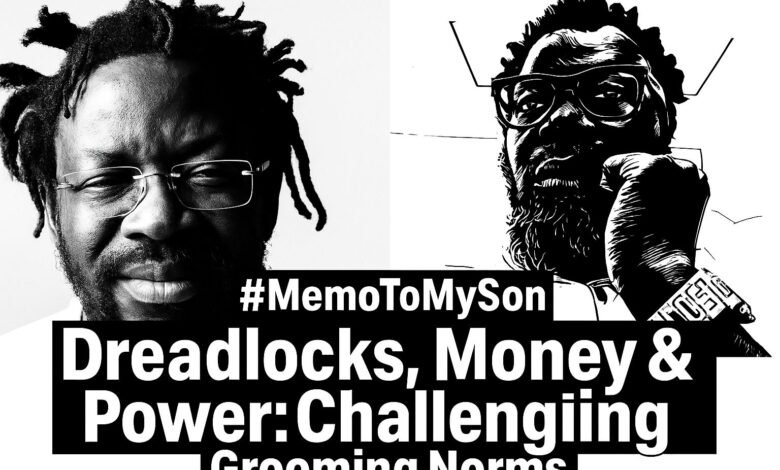Dreadlocks, Money, and Power: Challenging Global Norms in Leadership Grooming
#MemotoMySon

I came across a message on YouTube that suggested that if you, especially as a man, wear dreadlocks, you have unconsciously capped your influence. The speaker asked, “How many presidents wear dreadlocks? How many billionaires wear dreadlocks?” He then shared the testimony of a church member who, after hearing that sermon, went to cut off his dreadlocks, convinced that his hairstyle was the reason his potential hadn’t blossomed. “I removed the limitation,” the young man reportedly said.
This narrative is deeply troubling, not just because it was said, but because it reflects a more insidious belief system: one that equates conformity with success, and personal grooming with destiny.
As a father raising his first child, a toddler born in my twilight years, I am particularly concerned about the kind of world and culture we are shaping. A world that may teach my son to trade his God-given genius for societal approval, to conform rather than to create, to suppress divine intention in favor of human fables. And as Scripture warns, “See to it that no one takes you captive through hollow and deceptive philosophy, which depends on human tradition and the elemental spiritual forces of this world rather than on Christ” (Colossians 2:8, NIV).
As someone who has worked closely with young people for decades, I find this message reductive, myopic, and ultimately dangerous. It reduces the vast, layered meaning of life and purpose into a single formula: If you want to succeed, look the part. And ‘the part’ is narrowly, and often oppressively, defined.
Let us ask: Who defines influence? Who defines power? Must all roads to significance lead through politics or billion-dollar bank accounts? Is the human journey, diverse, divine, and deeply personal, to be measured only in Forbes covers and presidential handshakes?
Let’s be clear: grooming is not neutral. It is political. It is historical. It is racial.
Grooming is laden with assumptions about discipline, dignity, and deliverables. The man in dreadlocks must first disprove your bias before he can present his balance sheet. The woman in cornrows must earn your trust before she earns your vote.
But as global conversations around inclusion, authenticity, and identity continue to evolve, we are witnessing a quiet revolution. A revolution led by founders, finance experts, presidents, professors, and religious leaders, who wear their culture, quite literally, on their heads.
Consider this:
• There are billionaires in dreadlocks.
• There are professors in dreadlocks.
• There are policymakers and powerbrokers who wear locs, not just titles.
Let’s be honest: this narrative doesn’t arise from faith; it arises from fear. The fear of being different. The fear of not being accepted. The fear of not being invited to certain rooms. But history has shown us that the rooms that matter most are not always behind mahogany doors, they are in classrooms, villages, startups, studios, slums, and soup kitchens. They are anywhere a voice rises to confront injustice or a hand reaches out to lift another.
Dreadlocks are more than a hairstyle.
For some, they carry spiritual meaning. For others, cultural identity. For many, they are simply a personal choice.
It was a choice I once made, in solidarity with Dele Farotimi, who vowed not to cut his hair in protest against political injustice in Nigeria. And it is a choice I may still make again, if conviction demands it.
But above all, dreadlocks are not a limitation. The real limitation is a mind that believes success must wear a suit and tie, that power must be polished, and that leadership must be clean-shaven.
Let’s not forget: we live in a world where creativity is the new capital, where authenticity is a superpower, and where the ability to challenge norms, not conform to them, is what drives transformation. The global stage is changing, and so are its actors.
No, we don’t see many presidents with dreadlocks, yet. But that’s not because dreadlocks disqualify anyone from leadership. It’s because we still live in systems that demand sameness, systems that ask people to cut off pieces of themselves to fit in. But a generation is rising that will not trade identity for acceptance.
And by the way, we must resist the theological conditioning that suggests God is more impressed with grooming than with goodness. More taken with appearances than with compassion. The gospel is not an endorsement of colonial standards of beauty or Western constructs of professionalism. Jesus didn’t come to endorse suits. He came to liberate souls.
Let us raise children and youth who understand that dignity is not worn on the head—it is carried in the heart. That identity is not tied to hairstyle, it is anchored in values. That power is not earned by imitation, it is released through purpose.
So to the next child with locs, braids, curls, or coils, let this be known:
Your hair is not your hindrance.
Your truth is not your limitation.
The limitation is in a world that cannot see glory when it’s not wearing a tie.
Do have an INSPIRED week ahead with your family.


